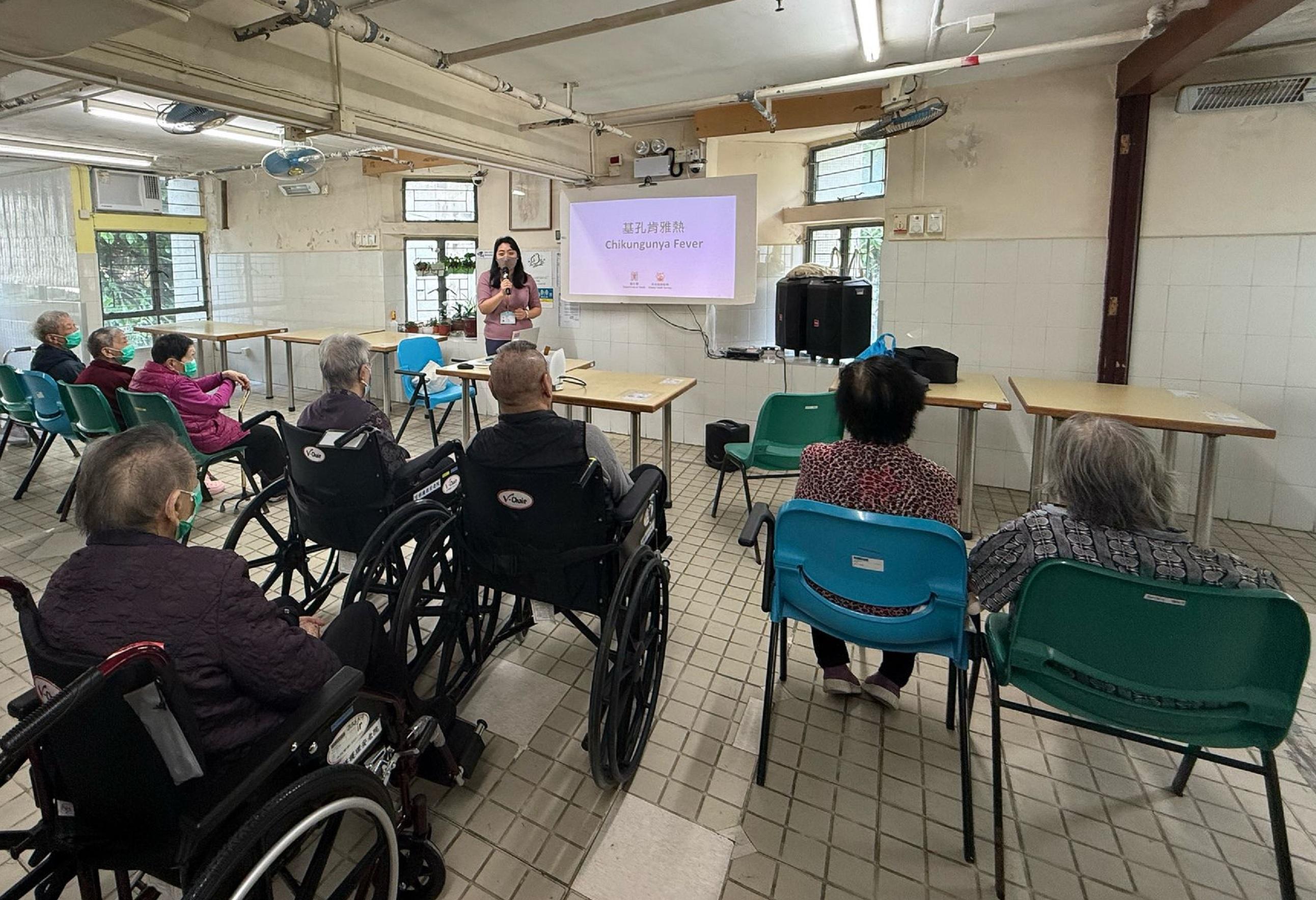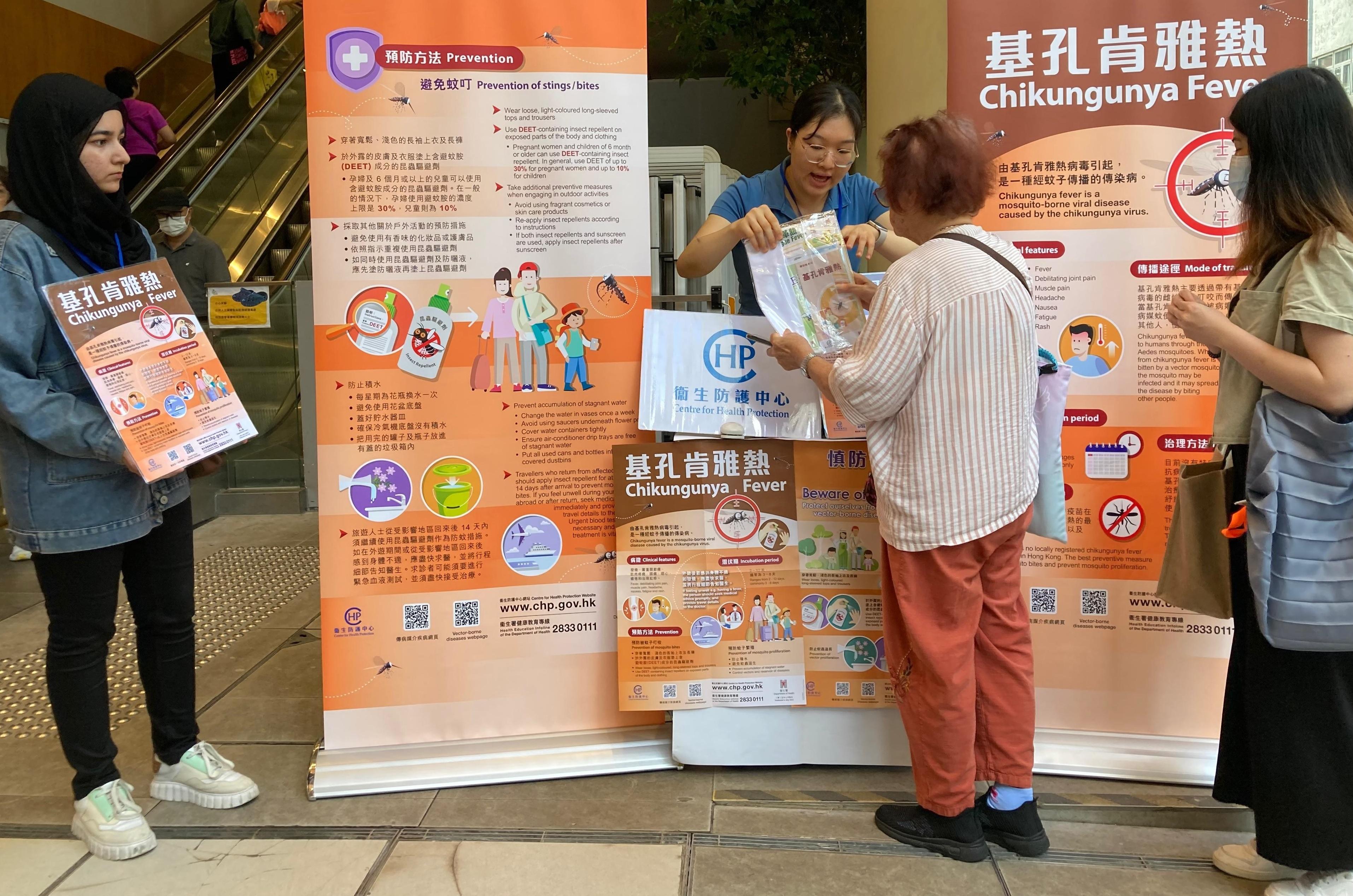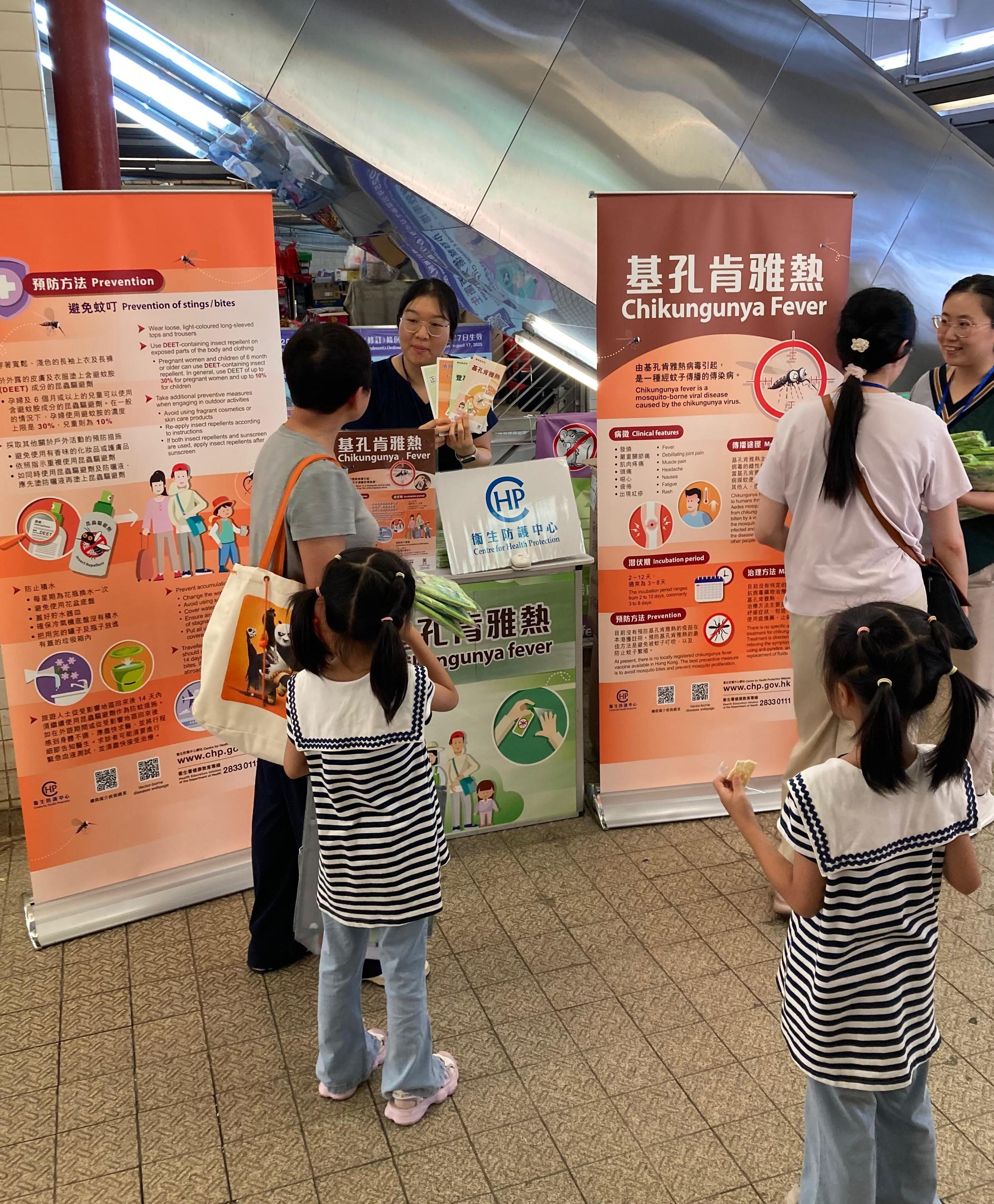CHP investigates one new case and one probable case of chikungunya fever (with photos)
**************************************************************************************
The confirmed imported case involved a 66-year-old female with underlying illnesses, living in Kwai Tsing District. Initial investigations revealed that the patient travelled alone to Foshan in Guangdong Province between July 24 and August 5, but did not recall a history of mosquito bites during the stay. She developed fever, rash and joint pain since August 6. She attended the Accident and Emergency Department of Yan Chai Hospital yesterday (August 7) and was admitted for treatment in a mosquito-free environment on the same day. She is currently in stable condition. Her blood sample tested positive for CF virus upon laboratory testing.
Since the patient stayed in Foshan during the whole incubation period, the CHP considered that the patient was infected during travel, and the case was classified as an imported case. She has no travel collaterals, and her household contacts are currently asymptomatic and under medical surveillance. The CHP's epidemiological investigations is ongoing and has reported the case to the health authorities of Guangdong.
The Food and Environmental Hygiene Department (FEHD) is conducting vector investigations and targeted mosquito control operations and will intensify mosquito prevention and control measures at the residence of the above patient, as well as locations visited after the onset of symptoms. These measures include:
- carrying out intensive fogging in the scrubby areas within 250-metre radius of the relevant locations to kill adult mosquitoes;
- carrying out inspection of the locations, removing stagnant water, applying insecticides and disposing of abandoned water containers every week with a view to preventing mosquito breeding; and
- enhancing public education efforts through organising health talks, setting up mobile education stations, and distributing publicity leaflets.
Another probable case involves a 22-year-old female with good past health. She lives in Eastern District. Initial investigations revealed that she travelled oversea between July 16 and August 4 (July 16 to 28: Madagascar; July 28 to August 3: Mauritius; August 3 to 4: Malaysia), then arrived Hong Kong on August 4. She recalled a history of mosquito bites during the stay in Madagascar. She developed fever, headache and multiple joint pain in Madagascar since July 25 and rash over four limbs since July 30. Her fever had subsided before returning to Hong Kong. After returning to Hong Kong, she sought medical attention due to joint pain at the Accident and Emergency Department of Pamela Youde Nethersole Eastern Hospital on August 4 and was admitted for treatment on the following day (August 5). She was discharged on August 7.
The patient's blood sample collected on August 4 tested negative in nucleic acid testing, while the blood sample collected on August 5 tested positive today for immunoglobulin M (IgM) antibodies to CF virus. The case is likely a recovered case. The CHP considered that the patient was no longer infectious to mosquito upon her return to Hong Kong. The CHP will arrange for a blood sample to be collected from the patient next week for a second antibody testing. If there is a more than four-fold increase in the antibody titre against the CF virus when compared with the first specimen, the case will be classified as a confirmed case.
A total of five CF cases have been recorded in Hong Kong this year, all of which were imported cases, and another probable case has been recorded. From 2016 to 2019, between one and 11 CF cases were recorded in Hong Kong each year, all of which were imported cases.
According to the World Health Organization, CF cases have been recorded in more than 110 countries/regions. As of July this year, over 240 000 cases had been reported in 16 countries/regions worldwide. Of these cases, about 90 were fatal.
The DH has enhanced publicity and education efforts regarding CF targeting different groups. The CHP's Port Health Division continues to step up inspections at boundary control points to ensure good environmental hygiene and effective implementation of anti-mosquito measures, and also distributes leaflets to travellers. The Port Health Division staff members has recently reminded MTR Corporation, cross-boundary coach and ferry companies operators and the Airport Authority Hong Kong to strengthen anti-mosquito measures. Furthermore, staff members of the Port Health Division also conduct temperature screening for inbound travellers. Any travellers with fever or related symptoms will be assessed for their health condition and referred to hospitals for follow-up when necessary.
To raise the awareness of the elderly on preventing CF, the Visiting Health Teams under the Elderly Health Service of the DH have been advising the elderly on CF prevention and travel health at the health talks conducted at District Elderly Community Centres and Neighbourhood Elderly Centres, and reminding residential care homes for the elderly to enhance mosquito control measures. The Visiting Health Teams under the Elderly Health Service has promoted information of CF prevention at more than 300 health promotion activities provided to the elderly and their carers. In addition, the Elderly Health Service has arranged for the distribution of relevant leaflets at Elderly Health Centres across the 18 districts, with a view to helping the elderly to learn about the symptoms of CF and enhance their awareness of prevention of CF. The Family Health Service has also advised pregnant women and infant carers at its Maternal and Child Health Centres about precautions for preventing CF. The Student Health Service will distribute promotional leaflets to students at its Student Health Service Centres and Special Assessment Centres so that students could learn more about symptoms of CF.
The Health Promotion Branch is committed to disseminating health information on the prevention of mosquito-borne diseases (including CF) to the public through multiple channels. Measures include setting up Info Stations across various districts in Hong Kong (www.chp.gov.hk/en/other/events/476.html) and distributing relevant health messages through different online and offline platforms, with content updated as appropriate in light of the latest developments. To strengthen support for ethnic minority communities, essential information on CF has also been translated into ten ethnic minority languages (including Hindi, Nepali, Urdu, Thai, Bahasa Indonesia, Tagalog, Vietnamese, Punjabi, Sinhala and Bengali) and uploaded to the CHP website. The Health Promotion Branch has also contacted stakeholders serving ethnic minority groups (such as non-governmental organisations and religious groups etc.) to distribute relevant health materials, so that more members of the public can access anti-mosquito information and work together to prevent the spread of CF.
The Head of the Communicable Disease Branch of the CHP, Dr Albert Au, reminded members of the public to adopt precautions in the rainy season against mosquito-borne diseases. If members of the public return from areas affected by mosquito-borne diseases, they should apply insect repellent for 14 days upon arrival in Hong Kong. They should closely observe their personal health condition, in particular symptoms such as fever, joint pain and rash. If they feel unwell, they should seek medical advice promptly and provide their travel details to the doctor for clinical diagnosis and arrangement of appropriate testing based on an individual patient's condition. Members of the public are urged not to self-medicate, particularly with aspirin or non-steroidal anti-inflammatory drugs (such as ibuprofen), as these drugs may cause serious side effects, for example increasing the risk of haemorrhage. In general, children should not take medications containing aspirin to relieve fever or other symptoms, as it may lead to a serious and potentially fatal complication called "Reye's syndrome".
The FEHD appeals to members of the public to continue to stay alert and work together to carry out mosquito prevention and control measures early, including inspecting their homes and surroundings to remove potential breeding grounds, changing water in vases and scrubbing their inner surfaces, removing water in saucers under potted plants at least once a week, and properly disposing of containers such as soft drink cans and lunch boxes. The FEHD also advises members of the public and estate management bodies to keep drains free of blockage and level all defective ground surfaces to prevent the accumulation of water. They should also scrub all drains and surface sewers with an alkaline detergent at least once a week to remove any mosquito eggs.
The public should call 1823 in case of mosquito problems and may visit the following pages for more information: the CF page of the CHP and the Travel Health Service, the latest Travel Health News, tips for using insect repellents, and the CHP Facebook Page, Instagram Account and YouTube Channel, and also Mosquito Prevention and Control dedicated page of the FEHD.
Ends/Friday, August 8, 2025
Issued at HKT 21:40
Issued at HKT 21:40
NNNN








